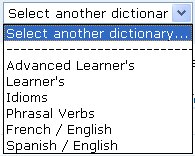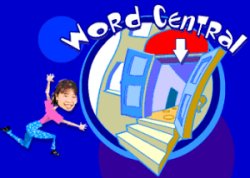Llengua anglesa a secundària. Competència digital
- guia
- Mòdul 0
- Mòdul 1
- Mòdul 2
- Mòdul 3
- Mòdul 4
- Mòdul 5
- Mòdul 6
- projecte
- índex
Online dictionaries
Your students may encounter vocabulary problems when they are working online. If they don’t have some dictionaries at hand, they may open a new window, look up the word in an online dictionary, then minimize the window and continue working.
Practice it!
- Cambridge Dictionaries Online http://dictionary.cambridge.org/ is an excellent site because it’s visually attractive and very intuitive. It makes a search in the Cambridge Advanced Learner’s Dictionary (English-English dictionary), which is also very adequate for students’ level.
 A search for potato, for example, will produce the following results:
A search for potato, for example, will produce the following results:
Each word or phrase links to its definition and is accompanied by an example.
In this site we can also search other dictionaries:
- Merriam Webster http://www.m-w.com/ is a good English-English dictionary and thesaurus.
Among its many features is the  .
.
Look up a word in the student dictionary here.
This section contains games so that kids play with words. They can make an experiment with a sentence in the Science Lab, code a text in the Computer Lab, or even invent a new word and publish it in Build-Your-Own Dictionary.
Activity framework
- Methodology: suggest your students that they open a new window in their browser with a bilingual (or monolingual) dictionary. When they are doing an activity and encounter a new word, then they can alternate between windows and get the meaning in just a few seconds.
Additional info
Other dictionaries that you might find useful:
- Little explorers English-Spanish picture dictionary (http://www.enchantedlearning.com/spanish/). A bilingual picture dictionary for kids. Some of the words have a link with a printout exercise.
- Visual Thesaurus http://www.visualthesaurus.com presents the words and their synonyms in a clickable mind map.
- Your dictionary http://yourdictionary.com/ has the widest set of dictionaries, grammars, and other language resources on the web (280 language dictionaries and 50 glossaries).
- One Look http://www.onelook.com/ finds definitions and translations in many online dictionaries at the same time.
- Diccionarios http://www.diccionarios.com/ There is a Spanish dictionary and a variety of bilingual dictionaries which includes Catalan. The site allows 3 searches in one session or 25 searches in a month to the free subscribers (and unlimited acces por paid subscribers).
- Logos http://www.logos.it/ offers a definition, image, sound, synonyms, a context and a translation for each word. Words can be edited in order to add more information (new translations, etymology…). It also includes a children’s dictionary, a verb conjugator and even an application to help solve crosswords.










